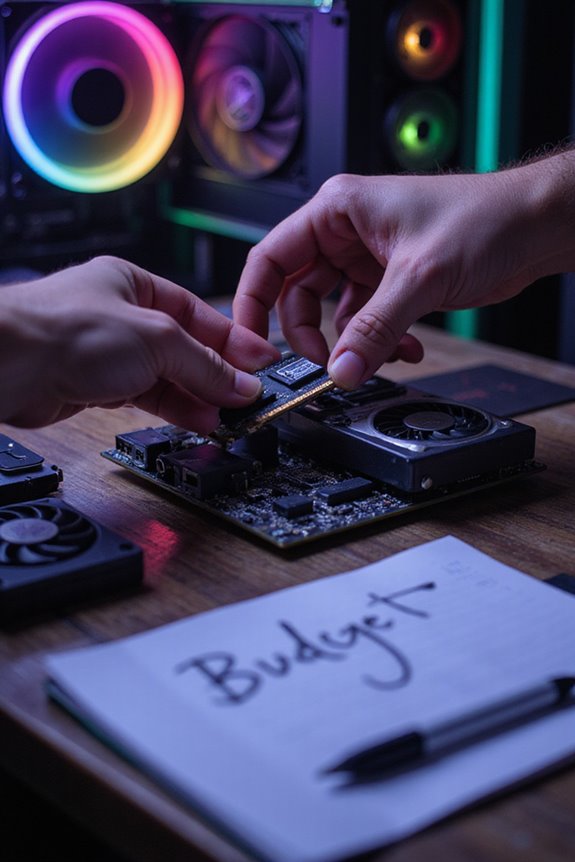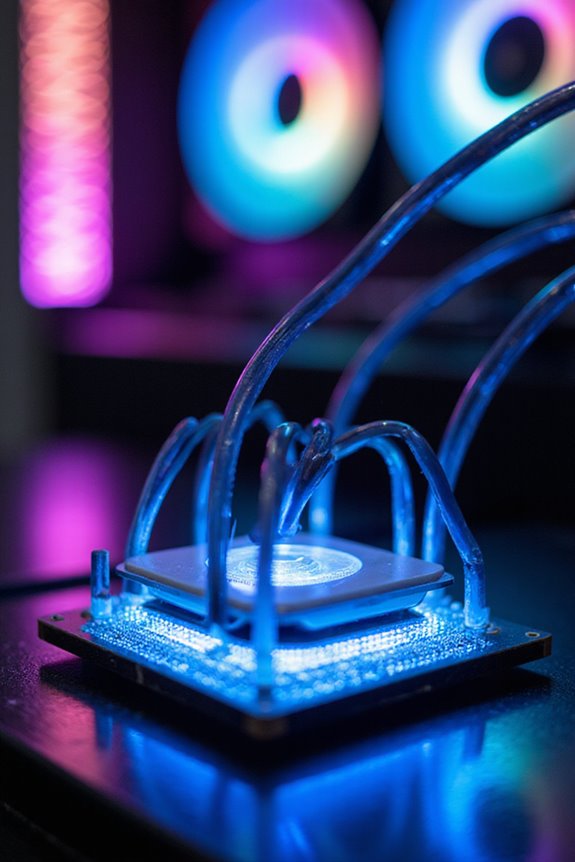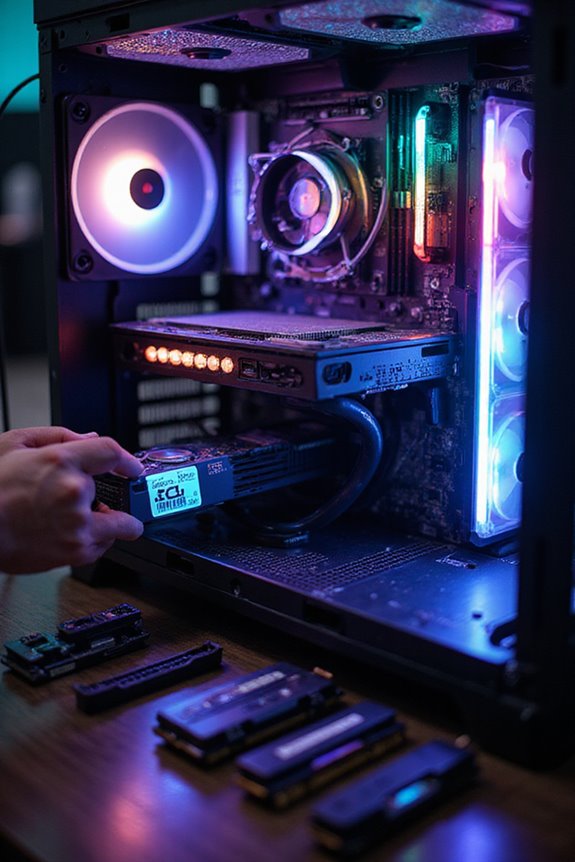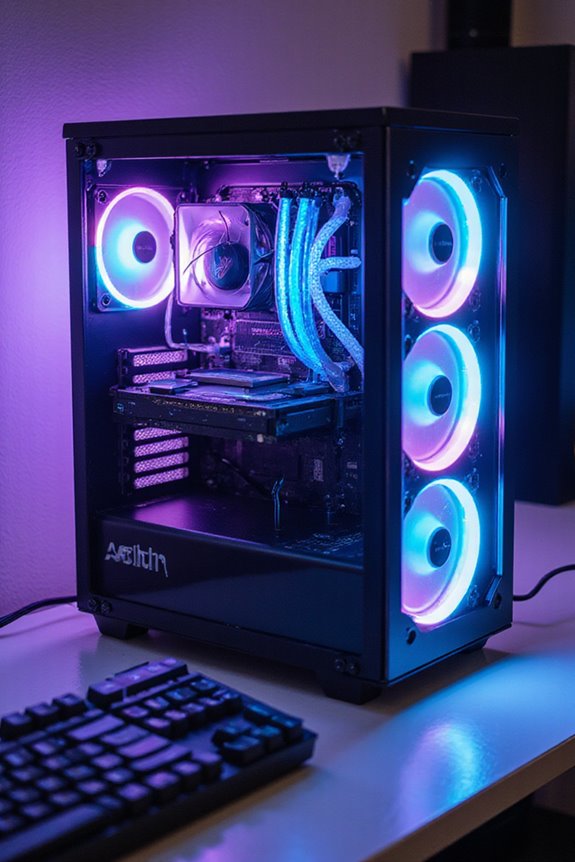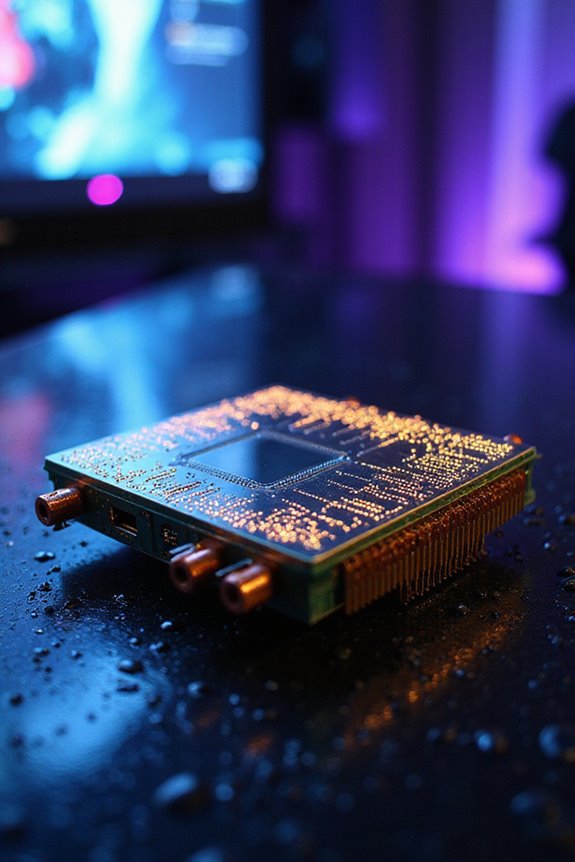Building a powerful gaming PC on a budget is totally achievable! Start with a Ryzen 5 5600 or Intel Core i5 14400F for solid performance. Pair it with 16 GB of DDR4-3200 MHz RAM and a 500 GB NVMe SSD for quick load times. Don’t skimp on a quality PSU, at least 80+ Gold certified, to guarantee reliability. And remember, a good cooling solution is key for performance. Stick around for more tips on optimizing your build!
Key Takeaways
- Set a budget of $800 to $1,200, focusing on essential components for maximum value without overspending.
- Choose a compatible motherboard and invest in 16 GB of DDR4-3200 MHz RAM for optimal performance.
- Select a reliable CPU like the Ryzen 5 5600 or Intel Core i5 14400F along with a capable GPU for gaming needs.
- Prioritize a 500 GB NVMe SSD for quick load times, and consider pairing it with a larger HDD for extra storage.
- Implement an efficient cooling system, like an AIO cooler, to maintain performance and reduce noise during gaming sessions.
Understanding Your Budget Constraints
When building a gaming PC on a budget, it’s essential to understand the financial limits you’re working with. Typically, budget builds range from $800 to $1,200, so it’s vital to prioritize what components you need most. Custom PC building offers flexibility, but don’t forget hidden costs like tools or software. Pre-built systems might match your performance needs at competitive prices, too, so weigh your options.
I’ve found that focusing on key components like CPUs and GPUs pays off. You can start with entry-level setups around $500, but remember, upgrading later is always a possibility. Research is your friend here. Compare prices and performance, and don’t shy away from entry-level options that deliver solid gaming experiences without breaking the bank.
Essential Components for Budget Gaming Builds
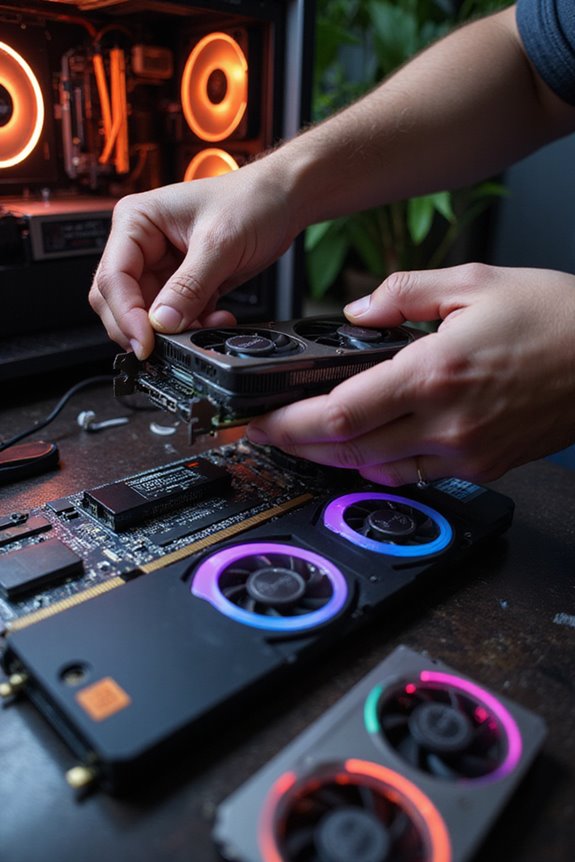
Building a budget gaming PC can feel overwhelming, especially with so many components to contemplate. Start with a compatible motherboard, choosing Micro ATX or Mini ITX for cost-effectiveness. Look for essential features like integrated Wi-Fi and enough ports for future upgrades. Next, 16 GB of DDR4-3200 MHz RAM is a solid choice; consider dual-channel for better performance, and brands like Corsair or Kingston won’t let you down.
For storage, an NVMe SSD of at least 500 GB is a must for fast loading times; Samsung and WD are reliable options. Finally, a good PSU is vital—aim for at least 80+ Gold efficiency. Trust me, investing in quality components now saves headaches later on.
Selecting the Right CPU and GPU
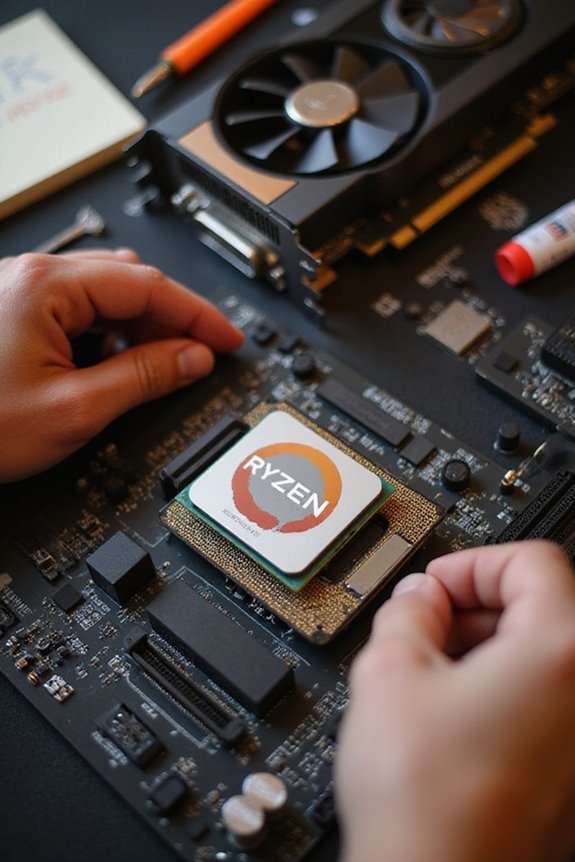
Selecting the right CPU and GPU is where the magic happens in your gaming PC build. For a solid CPU, I often recommend the Ryzen 5 5600 at around $99, or the Intel Core i5 14400F for its great value. If you’re on a tighter budget, the Ryzen 5 3500X can be a steal in the second-hand market. When it comes to GPUs, the Nvidia RTX 4060 strikes a good balance for 1440p gaming, while the Radeon RX 9070 XT offers power for more intense games, though it’s pricier. Remember to evaluate compatibility and potential future upgrades as you choose, because investing wisely now can save you headaches later. Happy building!
Optimizing RAM and Storage Solutions
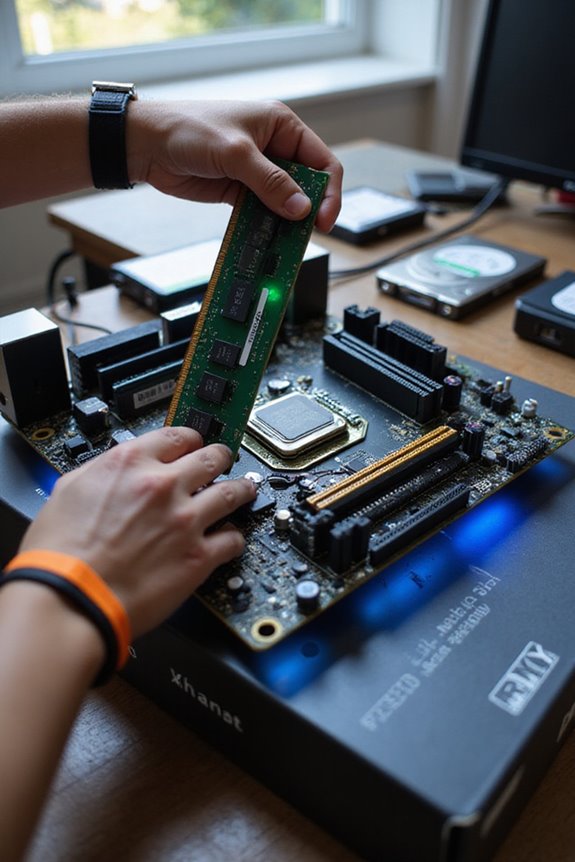
To get the most out of your gaming experience, optimizing your RAM and storage solutions is essential. I recommend starting with at least 16GB of RAM; it’s the sweet spot for gaming and future-proofing. If you’re multitasking or streaming, consider bumping that to 32GB. Opt for faster DDR5 RAM if your budget allows, but remember, non-RGB options can save you some cash for an SSD.
Speaking of storage, SSDs are a game changer. An NVMe SSD will give you lightning-fast load times, making your gaming smooth and responsive. A minimum of 500GB is ideal, but pairing your SSD with a larger HDD for extra space is a smart move. Balancing your budget here can make a noticeable difference!
Cooling Systems for Efficient Performance
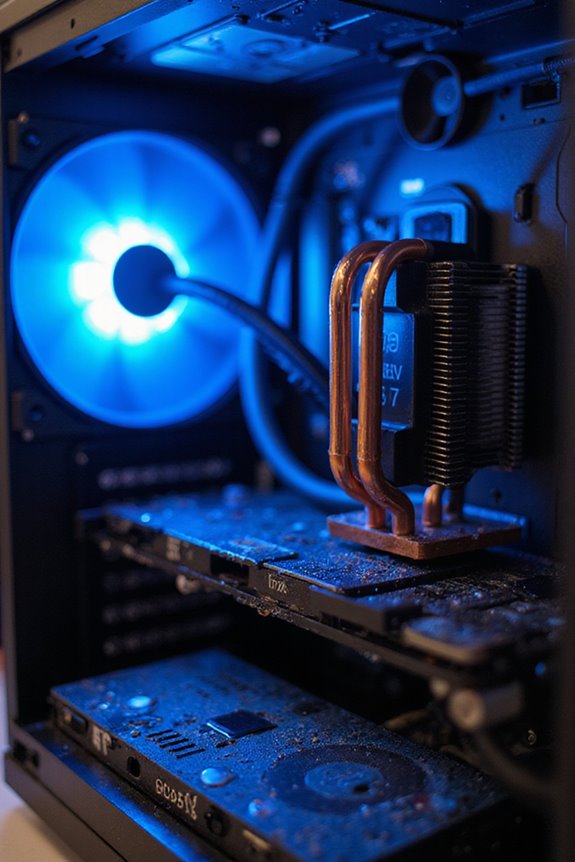
When it comes to keeping your gaming rig cool, the right cooling system can make all the difference in performance and longevity. For high-performance setups, I often lean towards liquid cooling—it efficiently dissipates heat and keeps things quiet. AIO coolers are particularly appealing since they’re easy to install and maintain, striking a balance between performance and convenience.
If you’re on a tighter budget, air cooling is a solid choice, though it may struggle under heavy loads. It’s cost-effective and easier to troubleshoot, but you might notice a bit more noise. Regardless of your choice, verify compatibility with your case and motherboard. Ultimately, a good cooling system is essential for an enjoyable gaming experience.
Building Your PC: Step-by-Step Guide
Building your own gaming PC can be an exciting journey, especially if you’re enthusiastic to plunge into the world of custom setups. Start by choosing a CPU with high clock speed and multi-threading capabilities; it’s crucial for gaming. Don’t forget motherboard compatibility—make sure it supports your CPU and has room for upgrades. When it comes to the graphics card, pick one that fits your budget and gaming needs, considering VRAM and GPU architecture.
Assemble your tools—screwdrivers and anti-static measures are essential. Installing the CPU is straightforward; align it in the socket and secure the cooler. After mounting the motherboard, install RAM and storage, then connect your PSU. Finally, power on your PC and enjoy the fruits of your labor!
Future-Proofing Your Budget Build
Future-proofing your budget build is essential if you want your gaming PC to stand the test of time. Start with at least 32GB of RAM and an NVMe SSD for speedy data access. Opt for a motherboard that supports the latest CPUs and has multiple PCIe slots for future upgrades. A strong GPU, like the RX 6750 XT, will keep your games running smoothly.
Don’t forget cooling solutions; a good airflow case and efficient CPU cooler are key. Keep an eye on your budget, but prioritize critical components like the CPU and GPU. Remember, planning for affordable upgrades now can save you from costly replacements later. With these choices, you’ll enjoy gaming without frequent interruptions for upgrades.
Frequently Asked Questions
What Are the Best Budget Gaming Monitors Available?
If you’re looking for budget gaming monitors, I’d recommend checking out the AOC Q27G3XMN and LG UltraGear 27GN800-B. They offer amazing performance without breaking the bank, perfect for enhancing your gaming experience!
How Can I Upgrade My PC Without Replacing the Entire Build?
Upgrading your PC feels like giving your old friend a makeover. I’d suggest starting with the CPU or GPU; they breathe new life into your system. Don’t forget about RAM and storage for a smoother experience!
Are There Any Budget-Friendly Gaming Peripherals Worth Considering?
I’ve found great budget-friendly gaming peripherals like the SteelSeries Arctis Nova 1 headset and Lamzu Thorn mouse. They offer fantastic performance without breaking the bank, making gaming enjoyable and accessible for everyone.
How Do I Troubleshoot Common PC Building Issues?
When I troubleshoot common PC building issues, I check connections, reseat components, inspect the power supply, and make certain BIOS settings are correct. It’s all about taking a methodical approach to pinpoint the problem effectively.
What Are the Benefits of Overclocking Budget Components?
Overclocking budget components has really transformed my gaming experience. I’ve seen better frame rates, extended hardware life, and unleashed performance I didn’t know was there. It’s like discovering hidden potential within my setup!

